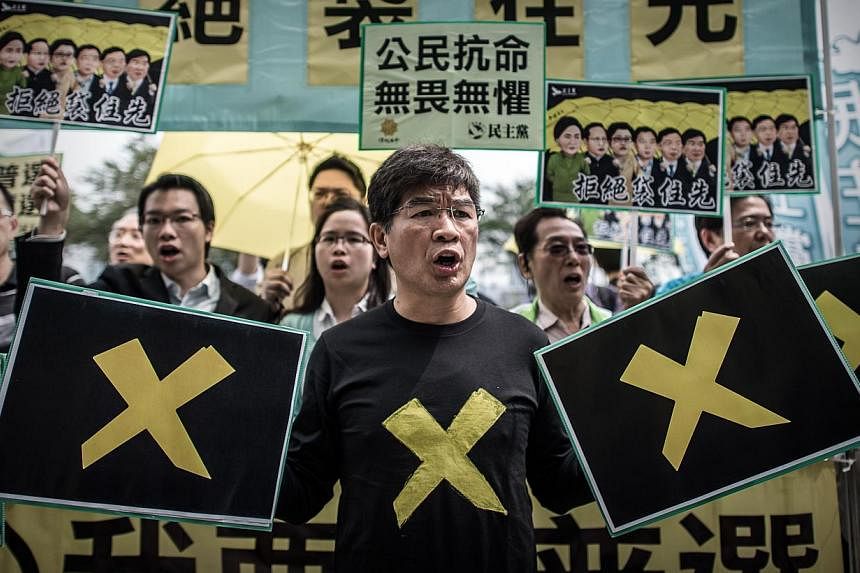HONG KONG (AFP) - From open-top bus tours and neighbourhood rallies to bicycle protests and dance routines, campaigners in Hong Kong are employing a range of tactics to win hearts and minds ahead of a key vote on the city's political future.
But for many residents, the canvassing and rhetoric is starting to wear thin as they accuse politicians of losing touch with the issues that affect their daily lives.
The government in the semi-autonomous southern Chinese city says its proposal to hold the first public vote to elect a leader - currently chosen by a pro-Beijing committee - is a step forward for democracy.
Opposition legislators and activists, however, reject the motion for 2017 as "fake democracy" as it sticks to Beijing's ruling that candidates must be vetted by a loyalist committee.
That decision sparked mass student-led street rallies that shut down parts of the financial hub for more than two months late last year in what came to be known as the Umbrella Movement.
Pro-democracy lawmakers make up more than a third of Hong Kong's de facto parliament and have vowed to block the proposal, which needs a two-thirds majority to pass. The vote is expected to take place in June.
Campaigners from both camps are eager to show that they have popular support.
In recent weeks, senior government politicians have toured neighbourhoods in open-top buses and are dropping in to deliver their "Make It Happen" message.
A campaign speech by current leader Leung Chun-ying saw a group of middle-aged women dance a choreographed routine to popular Chinese tune "Little Apple". A pro-government singer even delivered an off-key rendition of "Under a Vast Sky" by Hong Kong band Beyond, traditionally a pro-democracy anthem.
Elsewhere on the streets, pro-government group Alliance for Peace and Democracy (APD) said it had gathered 1.2 million signatures supporting the election plan.
"Hong Kong can choose between universal suffrage, having an election and voting for their own chief executive in peace, or they can decide to reject it and... bring chaos to Hong Kong," said APD spokesman Robert Chow.
City divided
Pro-democracy campaigners have also toured local neighbourhoods on trucks and protesters with yellow umbrellas - symbol of the democracy movement - regularly interrupt official events and campaign speeches.
Pan-democrat legislators bicycled through some of the city's most densely populated working class areas to deliver their message.
"We need to make use of every minute before the vote to really remind Hong Kong people why you would end up worse by pocketing the government proposal," said Civic Party leader Alan Leong.
"We don't want our vote to be used as a way to legitimise an electoral model that does not give Hong Kong people real choice." A rolling poll by three leading universities shows that the public is split.
The latest figures, based on a survey of more than 1,100 people, show 46 per cent oppose the government's plan while 39 per cent support it, with 15 per cent undecided.
While there are vocal supporters on both sides, many residents now feel alienated by the political tug of war.
"I don't support either side. Both sides are too extreme," student Patricia Lam, 20, told AFP.
"It's now a waste of time as there is no consensus at all." '
I feel powerless'
Housewife Yu Lai-mui, 59, said rising rail fares and building a better airport were more important.
"The Occupy movement was too radical," she said, referring to one of the most vocal groups involved in the months of protest at the end of 2014.
"I didn't support it. On the other hand, even if the political reform is passed, I don't see how it can bring advantage to people's livelihoods." In a city with a widening wealth gap and soaring housing costs, some say they are simply concerned with survival.
For 94-year-old Mr Mok, phone calls from political campaigners are a nuisance.
"I have hung up on them. At my age, I just care about my two meals," he said.
"I work 18 hours a day... I don't have time to care. Even if I do, what difference can I make?" added one 50-year-old construction worker who gave his name as Mr Law.
Although the pro-democracy movement has fragmented, there are still small-scale protests in busy Mong Kok, which saw some of the most violent clashes during last year's rallies.
But with no government concessions to date, residents fear that taking to the streets will have little impact.
"Sometimes they take over space around you and start shouting. I don't see the point," said a phone service vendor surnamed Cheung, in his 30s, who works in the area.
"I am quite fed up and feel powerless. I think a lot of Hong Kong people feel the same."

